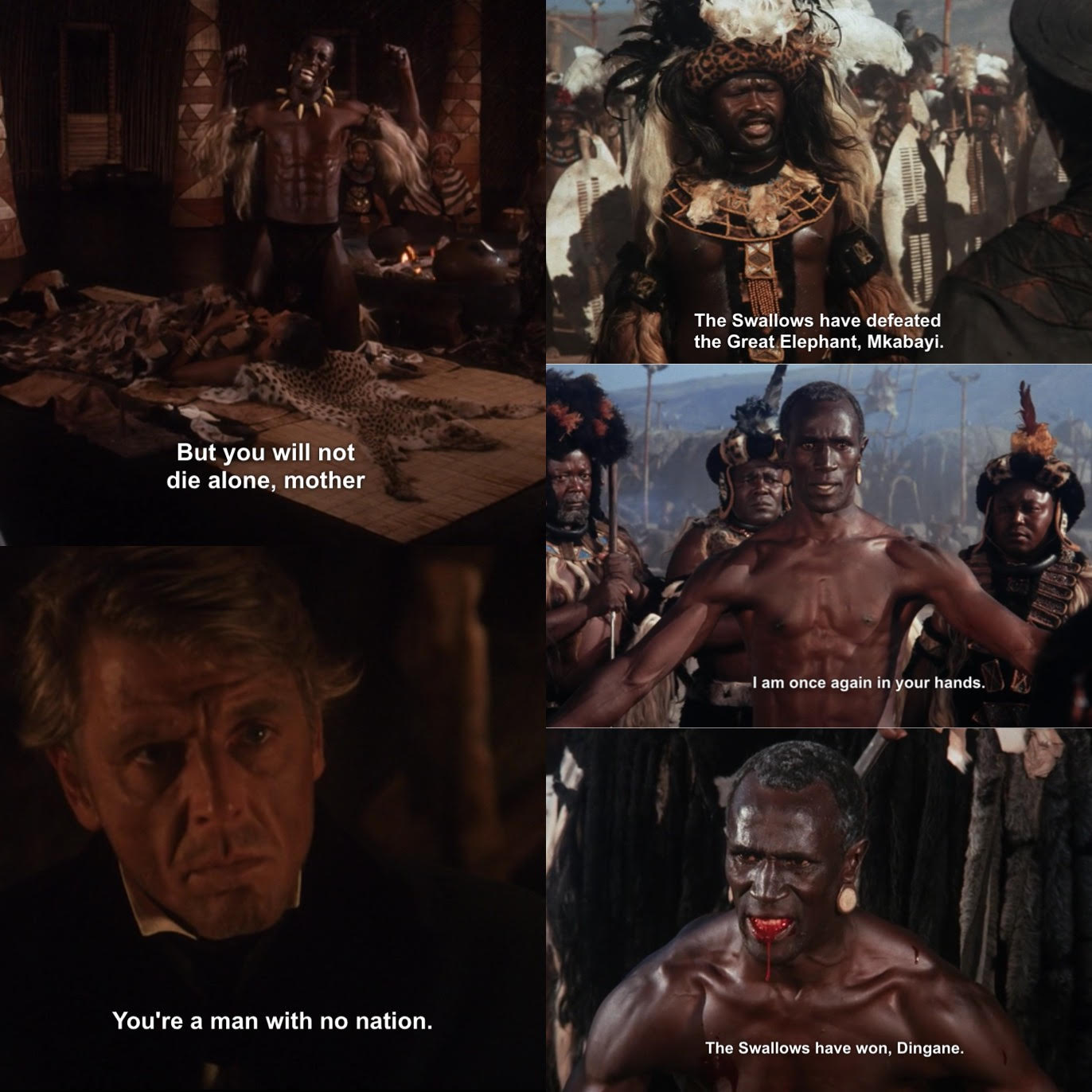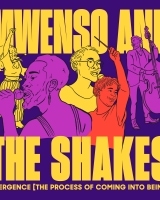Night-5 Hour-2

Mkabi: “Burn everything. Let nothing remain that reminds us of Shaka.”
— Mkabi orders Kwa Bulawayo burned, after aiding the assassins of her nephew, Shaka. From hour 10 of Shaka Zulu.
Americans continue to remember Zulu king Shaka because of the miniseries that bears his name. Indeed, they can instantly watch a fully-restored digital version on Netflix — bringing a story crafted for an era of censor-shaped episodic television into an ever-evolving age of viewers who binge-watch streaming content, and are unfazed by the gore and nudity that once made Shaka Zulu a risky proposition for Fox’s prime time network schedule. Thanks to a talented creative team, Shaka’s 10 hours remain an enticing option for fans of series-format fantasy like Game of Thrones, or history like Vikings. Yet it was distributor Harmony Gold that ultimately got those hours seen by American eyes during its crucial 1987 Fox network debut— and for better or worse, it is they who control the broadcast legacy of Shaka Zulu. The “worse” was expounded upon at length by Shaka Zulu screenwriter, Joshua Sinclair during our September 2013 interview for my film site, Camera In The Sun:
Harmony Gold was given Shaka as a gift. It was used to bypass the cultural boycott. The head of Harmony Gold, Frank Agrama has recently been convicted of tax fraud for his work with Silvio Berlusconi, and got three years in jail — which he won’t serve. But Harmony Gold is the name of a mine is South Africa. They needed to bypass the cultural boycott. I didn’t even realize this was happening, until years later. Because I had 8% of the income, and I never got that. I was just given a check once by Harmony Gold for $75,000. They have made $500 million, that we know of, from Shaka. For a TV series, that’s a lot. Harmony Gold, before Shaka Zulu, was a suite of 5 rooms above the Whisky a Go Go. It wasn’t called Harmony Gold. It was called “FAR International” — for Farouk Agrama International. After Shaka Zulu, they suddenly had their own building on Sunset Boulevard, and downstairs was this gigantic cut-out of Shaka. So that sort of tells you what the deal was. South African Broadcasting did something very strange for a production company. SABC put up the entire amount of the film, which cost 10 million rand — or about $12 million. The rand was stronger than the dollar in those days. SABC put up all the money, but they gave 60% of the income to Harmony Gold, plus expenses. That’s unheard of. All Harmony Gold had to do was sell the movie, which was pretty easy. Literally, Harmony Gold could have, and did, rake in 80% of the income of the film gross. South African Broadcasting didn’t even recoup, according to them, the 10 million rand that they had put up in the first place. So then there were monies being funneled into a bank in Switzerland, which I think Agrama had together with Berlusconi. Berlusconi was using Agrama as a fence, and South African Broadcasting was using Agrama as a fence. According to the cultural boycott, countries could not sell to SABC. So SABC didn’t appear as the producers. Harmony Gold appeared as the producers. Harmony Gold would get the money and, through a Swiss bank, give SABC back that money. Now, you don’t set something like that up with a guy like Frank Agrama or Berlusconi. Because you probably are setting yourself up to not see anything. So [Agrama] came in, he kept the 60%. And then he started to pay through the Swiss bank, through a fence company. They then were paying SABC part of the money. A lot of it stayed in the Swiss bank, and never hit South Africa. The South Africans themselves didn’t want it to hit South Africa. So the involvement was, [Agrama] did some sales that put Harmony Gold on the map. They gave Harmony Gold a name, which is a gold mine in South Africa. It made [Agrama] rich overnight. And in a way it helped Shaka, because they sold it everywhere. But many people thought that Harmony Gold had produced it, and had paid for it — when in fact, that’s not what happened at all. I told the head of the legal department at SABC, “You guys are nuts.” He came to see me in London, because he was the one who negotiated the deal where everything had to be signed, after I sued them. We became friends, actually. He understood my point of view, and he actually honored it. I said, “You guys are nuts. This is a chance for you to show the world that you’re doing something good for the Black people. You’re showing their heritage. You’re showing how important they were to the history of South Africa. You’re doing something good. In a way, it makes up for many of the mistakes of apartheid. Why wouldn’t you want people to know you are doing it? Why wouldn’t you want people to know that you’re spending 10 million rand on the Zulus history? That’s a great plus for you.” They didn’t get it. They said, “Oh, but people won’t buy it from us, because of the cultural boycott.” I said, “You can burst the cultural boycott by just making a case for what you’re doing. I think people will understand. Just go out there and tell the truth. ‘We’re making this, because we believe that the heritage of the Black people and the Zulus is as important as that of the Afrikaners and the Brits in South Africa. We’re spending government money to make this, which is going to be one of the biggest epic series ever made. And we’re doing it for the Zulus. Not for the Afrikaners. Not for the Brits. For the Zulus.’ They’ll like that. They’ll buy it from you.” But they didn’t get that. They were afraid.
Fear is how Shaka rules over his people during the final hour of the miniseries. Following the death of his mother, Nandi, the king lays waste to his own empire with a vindictive form of grief that Dr. Henry Fynn chronicles in his journal voiceover:
With the death of the great female elephant, it was deemed probable that the heavens and the earth would unite in bewailing her death. And thus, the sacrifice from man would also be great. No cultivation would be allowed for the following year. No milk would be used. But as drawn from the cow, it should be all poured upon the earth. All women found with child during the year of wailing would, with their husbands, be put to death. All that was a promise of light and youth would be destroyed. The inhuman edict, condemning the whole population to starvation and unnatural abstinence was, through abject fear, received with acclamation. And regiments of soldiers were dispersed throughout the empire to massacre all those who failed to obey. We were confined to Port Natal, until Shaka, who quite irrationally was blaming us for his misfortunes, should decide how best to deal with the treachery of the creatures from the sea.
For Shaka, the most treacherous of those seafaring creatures is Lt. Francis Farewell, who returns to Natal with the unsuccessful Zulu embassy to the British, only to discover that the Zulu king is taking his army south to attack the Cape colony — continuing a campaign that the Swallows interrupted three years earlier. So, Farewell rides his horse south across a burnt and body-strewn Natal landscape, and intercepts Shaka at his field camp. There, they have a tense reunion, with a bitterly morose Shaka greeting Farewell with a question that sums up their mutual treatment of one another:
Shaka: “Tell me… Febana, how do you trap a monkey?”
Farewell: “Well, a gourd is used, with a narrow neck. Bait is dropped into the gourd — a piece of fruit, or… or something shiny. The monkey puts his hand down into the neck of the gourd, and then he grabs the bait, and, uh… then he is trapped, because he can’t get his fist out.”
Shaka: “Once he realizes… he is trapped, why doesn’t the monkey let go of the bait?”
Farewell: “Because his greed makes him blind.”
Shaka: “And what is he greedy for… Febana?”
Farewell: “I don’t know. I suppose for what he thinks he cannot have.”
Shaka: “And what new bait have you brought, Febana? Bring it here for this monkey to see. Something shiny? Like the freshness of youth, of life, of the past? Bait your gourd again, Febana. My heart yearns for something shiny.”
Farewell: “Nkosi… that yearning… which has brought about everything that has happened, was as much your fault as it is mine. But hating my people is not the solution. We must search for another… together.”
Shaka: “Together? [scoffs] No, Febana. You have proved that you were never with me. You are a man with no nation. You are a shadow. Go! I have no need for you anymore.”
Farewell: “Go? Go? Where? Where… can I go?”
Shaka: “Where I have been.”
Exhile. It is not the horrific impalement Farewell likely expected. Yet, for a vibrant spirit like his, it means the ongoing pain of a living death. He is now neither Zulu, nor British — having renounced his loyalty to the English crown so as to avoid a court marshall, and secure the Zulu embassy a (ultimately, fruitless) meeting with Cape colony governor Lord Somerset. Now an outcast, he is sentenced to wander the world without a people, just as young Shaka once did. It is the final strike of the Zulu king’s mind games with the Swallows. However, it comes on the cusp Shaka’s own final downfall. On the eve of attacking the British, the warrior king abandons his army, and wanders alone back to Kwa Bulawayo. There, he is met by Mkabi, who has organized a coup that puts her treacherous nephew, Dingane on the Zulu throne. The handover is completed when a naked Shaka allows his half-brothers to stab him to death with the same iklwa spears that changed the course of Zulu history. As blood pours from his mouth, Shaka spits a last bitter message at his heir:
The Swallows have won, Dingane!
In truth, it is Shaka Zulu that triumphs as a miniseries. Despite challenges of a cultural boycott and censor restrictions, it found the massive television audience it was designed for. The story may be a fictionalized account, but it was a propulsive tale of an important historic figure who had previously been unknown to most of the world. More importantly, his story was given the space of 10 hours to explore both the ecstatic heights and excruciating flaws of his public reign and personal character. They play out now via streaming sites to mobile devices and household screens. Indeed, long after his empire turned to ash, the wind may not whisper the name “Shaka,” as Henry Cele declares early on, but ever-evolving digital currents still carry his cinematic story in all its complicated glory. Forget macassar hair dye — that is immortality.

